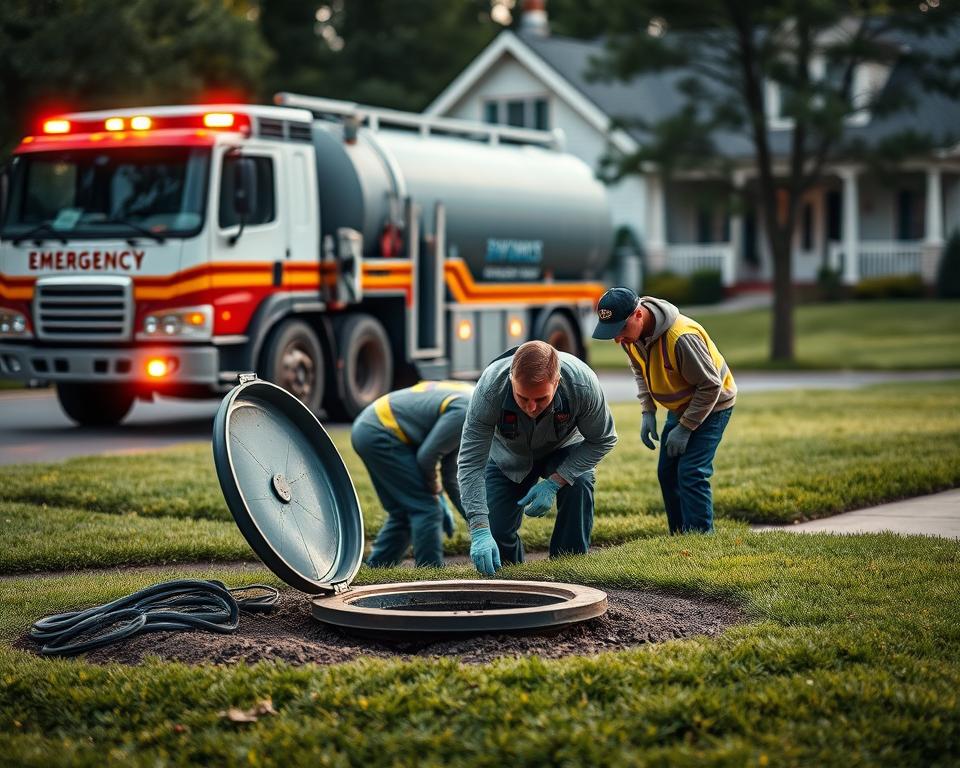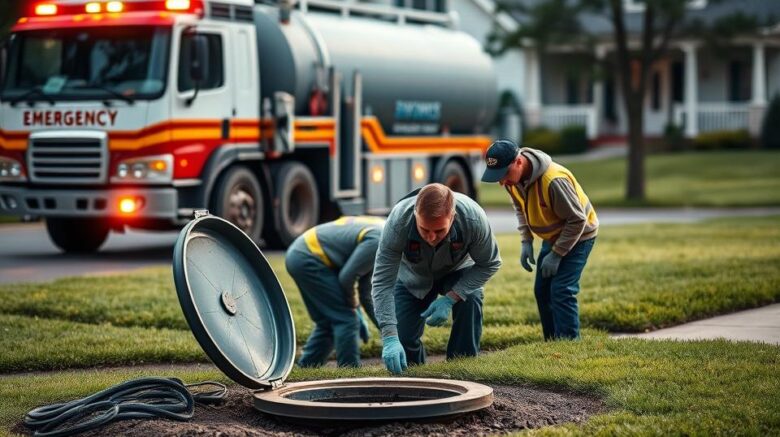Septic System Maintenance
Have you ever pondered about the effects of ignoring septic system care? For homeowners relying on these units for sewage handling, missing routine care can lead to significant bills. It also creates dangers to both health and the environment. Servicing your septic system is more than a basic task; it’s essential for guaranteeing your residence runs smoothly. By regularly emptying your septic tank, you prevent sediment collection and prolong the lifespan of your setup. This preventive stance helps you sidestep any undesirable scenarios. Discover the value of septic tank care and the steps entailed with septic inspection near me.
Top Highlights
- Routine septic system cleaning is vital for warding off costly restorations.
- Overlooking upkeep can cause dangerous conditions for your household.
- Knowing your septic system helps in proper stewardship.
- Indicators of a malfunctioning septic system should be recognized early.
- Expert technicians can assist in preserving excellent tank health.
Understanding Your Septic System
A septic system is an effective on‑property approach for treating wastewater. It mainly consists of two parts: the septic tank and the drainfield. Both are integral for ensuring adequate purification and protecting the surroundings.
The septic tank gathers wastewater from your home. Inside,, waste solids settle to the bottom, and effluent rise to the upper layer. Naturally occurring bacteria within the tank digest the organic material, making the effluent easier to process. This initially processed wastewater then travels to the leachfield for further purification by the ground, completing the cycle.
It’s crucial for homeowners to grasp the dynamics of their septic system. Learning how the septic tank and field work in tandem can lead to enhanced system care. This knowledge promotes proper maintenance methods, helping guarantee the system’s durability.

Significance of Regular Septic System Cleaning
Consistent servicing of the septic system is essential for home and environmental health. If neglected, unprocessed wastewater can seep into your yard. This escape might lead to groundwater contamination, posing health hazards. By keeping the septic system clean, you safeguard your loved ones and the ecosystem.
It’s suggested to service the septic system every three‑to‑five years, depending on how much you rely on it. Such maintenance is not just good for the planet; it avoids costly fixes. A septic system that’s properly cared for operates better, providing a healthier home environment and a cleaner environment.
Indicators Your Septic Tank Needs Cleaning
Homeowners need to identify signals that their septic tank may need pumping. Primary signals to monitor include:
- Slow draining in basins, showers, and loos
- Foul stenches near the leachfield
- Sewage overflows in interior drains
- Extended damp zones or extra‑green sections of grass over the septic system
It’s essential to identify these warnings early to prevent significant septic tank issues. Scheduled inspections are vital. They detect issues before they escalate to pricey fixes. Examining your system regularly confirms it works well and survives longer.
Staying alert and moving promptly are crucial for septic system upkeep. By monitoring these alerts, you can keep your septic system in top shape.
Septic System Cleaning Intervals
Pumping your septic system consistently is central to keeping your home’s plumbing in top shape. Professionals generally advise cleaning the septic tank every three to five years. However, this can differ depending on the capacity of your family, how much usage you have, and the size of your tank.
If you have a big household that consumes more water, you could need to pump the system more often. Tracking your water usage can help you figure out if you need to adjust your cleaning schedule.
All in Sanitation advises setting up a consistent pumping schedule that suits your household’s unique needs. Sticking to a set maintenance program keeps your septic system operating effectively and avoids expensive repairs.
Septic System Cleaning: Top Tips
For a septic system to keep healthy, homeowners must practice key practices. It’s vital not to send down items that won’t break down; doing so avoids clogs and keeps the system running smoothly. Similarly, minimizing household chemical usage preserves the necessary bacterial balance. These measures are vital for the system’s longevity and effectiveness.
Proactivity with regular inspections is key. Setting up routine assessments can catch issues quickly, facilitating swift solutions. Additionally, conserving water through fixing leaks and careful usage aids septic tank health. These practices ensure the system runs efficiently for decades.
It’s also important not to drive on the leachfield. Maintaining this area clear ensures it properly manage effluent, safeguarding your system from issues. Listening to advice from experts like All in Sanitation also boosts septic system care.
The Steps of Septic Tank Pumping
For homeowners, learning the septic system cleaning process is important. A licensed septic pumper should conduct routine septic tank pumping to keep your system operating properly. The first step is checking the tank’s condition to see when it is due for pumping.
A septic tank demands pumping once the solid layer fill about one‑third to 50 percent of its space. The licensed septic pumper will then extract these solids. This procedure maintains the system’s performance. Furthermore, the appointment may involve checking the tank for potential issues, enabling immediate fixes.
Keeping a record of each pumping session is wise. This log enables you to monitor their septic system’s maintenance, and is valuable if transferring the property. Regular septic system maintenance boosts its service life and performance, averting expensive fixes down the line.
Septic Tank Inspection: What to Look For
Regular inspections are vital for your septic system’s health. Using a detailed septic tank inspection checklist can uncover possible issues promptly. Inspections should be performed by a qualified technician every 1‑2 years. They will measure sludge buildup and the floating layer during this visit.
Checking the inlet and outlet baffles and filters is also important. These parts are critical for your septic system’s efficient function. Spotting drips or failures promptly can prevent high repair costs. Forward‑thinking measures, like using an inspection checklist, extend your system’s lifespan and efficiency.
Professional Septic System Services
Utilizing professional septic system services is vital for your septic system’s efficiency. By choosing a company like All in Sanitation, you make sure that qualified professionals handle the pumping, check‑ups, and repairs meticulously. Licensed septic professionals carry specialized knowledge, helping homeowners to maintain the system’s optimal functionality over the years.
Maintenance by licensed experts lowers the likelihood of surprise failures and expensive repairs. These services include detailed inspections that check the system’s status, pinpointing possible problems early. Taking this proactive stance substantially prolongs your septic system’s longevity.
In the end, delegating your septic system to licensed professionals offers confidence. Collaborating with companies such as All in Sanitation leverages their know‑how. It ensures the integrity of your tank, creating confidence in its maintenance.
Septic System Maintenance Hints for Homeowners
Homeowners have the power to keep their septic systems operating reliably. Following effective care hints markedly enhances their operation. Implementing straightforward changes to how we use water, like cutting down on excess use and spreading the use of appliances, reduces pressure on the system.
Fitting low‑flow fixtures in your restrooms and cooking areas greatly bolsters septic durability. These fixtures cut down water use without sacrificing functionality. Not using garbage disposals is prudent too, as they lead to more residue in the system, requiring more frequent upkeep.
Regular inspections and following a thorough maintenance schedule will extend your septic system’s lifespan. Paying attention of everything that flows into your drains is key for maintaining a healthy septic environment. By embracing these tips, you’ll immensely boost your septic system’s functionality and lifespan.
Common Septic System Repairs
Septic systems may encounter various problems over time, requiring repairs. Frequent problems involve seepage, damaged baffles, and drainage issues in the absorption area. By spotting the symptoms early, homeowners can resolve them swiftly, ensuring their system stays in solid condition.
Typical repairs consist of:
- Swapping damaged parts to bring back system integrity
- Fixing or changing cracked conduits to prevent leaks
- Unblocking clogged lines to maintain proper drainage
Handling septic problems swiftly not only cuts costs over time but also extends the system’s service years. Routine check‑ups and maintenance can avoid these problems, supporting the maintenance of a robust septic system.
Final Thoughts
Preserving your septic system robust is critical to planetary and household well‑being. Routine pumpings and check‑ups prevent hefty bills and dangers. Being proactive with septic care protects time and reduces concern.
Engaging experts like All in Sanitation guarantees first‑class upkeep tailored for your needs. Their experience helps catch issues quickly, preventing serious troubles and underscoring the need for routine inspections.
Following sound methods for septic maintenance ensures long‑term system effectiveness. A bit of maintenance today secures a more reliable septic system in the years ahead.
